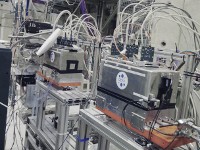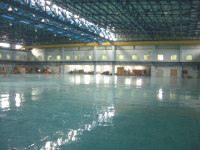From KEK: Call for opinions: Japan faces severe science budget cut

Atsuto Suzuki, KEK Director General |
The research program at High Energy Accelerator Research Organization (KEK) is facing a grave possibility of a severe budget cut, as recommended by the recently issued Public Budget Review by Japanese government. This affects Japanese renowned research programs including the ones hosted by KEK, such as elementary particle physics and related fields in astrophysics, material and life sciences. More than 260 universities and laboratories attend these programs. I would like to take this opportunity to explain to you what KEK is doing to enhance its research and education programs, and also would like to solicit your opinions.
Read more...
-- Atsuto Suzuki, Director General, High Energy Accelerator Research Organisation (KEK) |
|
 |
EU projects get musical
All about the AIDA project proposal

It's projects like the EUDET telescope – pictured here at work in the CERN test beam for the ALFA project – that AIDA wants to take further. Image: Sune Jakobsen |
Greek mythology, cartoon characters and plays on words – projects and collaborations in high-energy physics don’t always conform to the stereotype of the incomprehensible acronym. If a new project to be submitted to the European Commission for funding, answering a call from it Seventh Framework programme (FP7), gets approval, the world of opera can be added to the list above. AIDA – for Advanced European Infrastructures for Detectors and Accelerators (the E from European is silent) – would draw together every group and project in Europe working on detector R&D for next-generation projects.
Read more...
-- Barbara Warmbein |
 |
|
|
 |
From Mainichi.jp
1 December 2009
事業仕分け:科技予算見直し、厳しい判定に反発強く 科学重視、効率化が課題
Read more... (in Japanese) |
|
From Daily Herald
1 December 2009
Fermilab has no hard feelings toward lab that bested it
Read more... |
|
From Times online
1 December 2009
Physicists fear CERN costs are a threat to nuclear energy research
Read more... |
|
From New Scientist blog
30 November 2009
Is British nuclear physics doomed?
Read more... |
|
From Libération
30 November 2009
«Dès 2010, le LHC produira une physique excitante»
Read more... (in French) |
|
From Yomuri Online
30 November 2009
科技予算、「仕分け」と「総合会議」で評価食い違い
Read more... (in Japanese) |
|
From The Yomiuri Shimbun
28 November 2009
6 Nobelists hold talks with Hatoyama on science funds
Read more... |
|
From AFP
26 November 2009
Japan scientists attack govt research cut plans
Read more... (in English)
Read more... (in French) |
|
From Nikkei.com
25 November 2009
「若手育成、未来の投資」 事業仕分けにノーベル賞受賞者ら懸念
Read more... (in Japanese) |
|
From IPMU
24 November 2009
Funding cuts threaten globalization of Japanese science, scientists fear
Read more... |
|
From J-PARC
24 November 2009
First Neutrino Events Observed at T2K Near Detector
Read more... |
|
From Polskie Radio Online
23 November 2009
Co po LHC?
Read more... (in Polish) |
|
From Nature
17 November 2009
Japanese science faces deep cuts
Read more... |
|
|
 |
 |
|
|
 |
"Open Sesame"

The large SESAME building, 75 metres by 75 metres, built by the Jordanian government |
Most of us have known the expression "Open Sesame" since childhood and have associated it with magic powers. It comes from the tale of "Ali Baba and the forty thieves," when by magic, Ali Baba is able to open the door to the hidden treasure with that simple command. Last year, an exciting new laboratory in Jordan also named SESAME celebrated what they called a "soft" inauguration (or "opening"). Soft because it denoted the official start of this project by completion of the impressive accelerator building that will house the facility and the start of installation of the injector. These are visible first steps toward developing a state-of-the-art synchrotron light facility for the Middle East. I had the pleasure of visiting SESAME last month and spent very informative days meeting with the staff and learning of their detailed plans and aspirations.
Read more...
-- Barry Barish
Director's Corner Archive |
 |
|
|
 |
LHC sets new world record

CERN's Large Hadron Collider became the world's highest energy particle accelerator on 30 November, having accelerated its twin beams of protons to an energy of 1.18 TeV in the early hours of the morning. It marks another important milestone on the road to first physics at the LHC in 2010. Image: CERN
Read the press release
View more photos
Watch the video
|
|
arXiv preprints
0911.5575
Comparison of Measurements of Charge Transfer Inefficiencies in a CCD with High-Speed Column Parallel Readout
0911.5551
Study of Higgs self couplings of a supersymmetric E6 model at the International Linear Collider
0911.4995
Higgs mediated Double Flavor Violating top decays in Effective Theories
0911.4868
Correlations between high-pT and flavour physics
0911.4575
Energy Reconstruction of Hadron Showers in the CALICE Calorimeters
0911.4508
Probing Long Range Scalar Dark Forces in Terrestrial Experiments
|
|

